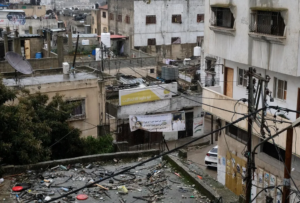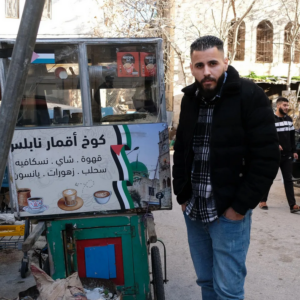In this story, the killing of two innocent Palestinians by Israeli troops was just the beginning

Balata refugee camp
Gideon Levy reports in Haaretz on 17 January 2025:
His perforated, scarred body tells his hair-raising story.
Two weeks ago, we documented an incident in Balata refugee camp, in the West Bank city of Nablus, in which an 80-year-old woman who had been walking in the street and a barber who was in the kitchen of his home were killed. The shooters were from the Israel Defense Forces’ undercover, antiterrorism Duvdevan unit, which raided the camp in broad daylight and sprayed the streets with gunfire, indiscriminately.
After the story was published, we received a video clip showing the force arriving in the camp that day, December 19, 2024, in a Palestinian ambulance, in violation of international law. In the wake of that revelation, the IDF Spokesperson’s Unit issued a statement according to which this was “a grave mishap, exceeding authority, and a violation of orders and procedures,” adding that the commander of Duvdevan had been reprimanded.We didn’t think that on that grim day other serious incidents had occurred during the failed operation in Balata. But we subsequently discovered that at least one more totally innocent person was a casualty of Duvdevan’s wanton behavior that day.
In a small hotel, the Al Yasmeen, situated in the heart of Nablus’ dense casbah, we met this week with Hussein Abu Lail, 25, from Balata. He’s the proprietor of a small grocery store in the camp and the father of an 8-month-old baby boy. Abu Lail had never been arrested or interrogated until that blighted day in Balata, when the supposedly elite Duvdevan unit raided the camp for an arrest and assassination operation. That quickly deteriorated into an event of unrestrained shooting and killing, as well as the war crime of using an ambulance for attack purposes.
Driving into the midst of the casbah in a car bearing Israeli license plates was a challenge this week, even with two Palestinian field researchers – Salma a-Deb’i and Abd al-Karim Sa’adi – from the human rights organization B’Tselem in the car. These are very tense days in the West Bank. Improvised valet parking, the initiative of a storekeeper in the casbah, solved that problem for 15 shekels ($4). Abu Lail was waiting for us in the dining room, on the top floor of the three-star hotel, along with a friend from Balata who wished to remain anonymous.

Hussein Abu Lail, Nablus, January 2025
It was immediately apparent that our interlocutor was a walking wreck. When he pulled up his shirt, we saw how his whole upper body was crisscrossed with bullet holes, scars, hemorrhage bruises, surgical stitches. Pain was etched into his ashen face, and was confirmed by the more palpable signs of the trauma he had undergone. It’s hard to understand how he survived the event.
On December 19, Hussein Abu Lail rose at around 10 A.M. and stepped outside the front door of his home for a smoke. He had just noticed a white van and a Palestinian ambulance, parked on the street, when he came under fire. A bullet hit him in the stomach and he collapsed, bleeding. Abu Lail managed to crawl into a nearby household-goods store. It was empty, its owner having fled moments before, when the shooting started. He was bleeding profusely.
After about 40 minutes, he estimates, he found a cushion and used it to try to staunch the blood that he was losing through the bullet’s gaping exit wound in his back. While he lay on the floor of the store, a small drone with camera and loudspeaker attached suddenly swooped inside. A voice from the speaker asked him in Arabic what his name was. He gave his name and added that he was an innocent civilian. The drone remained in the store for about 20 minutes, he thinks, before leaving.
Abu Lail, who was fortunate enough to have his phone with him, tried to summon an ambulance with his cellphone, but the ambulance driver he called, who had already picked up the body of Halima Abu Lail – the 80-year-old woman whom the soldiers had killed earlier on the street – told him that the army was preventing him from collecting the wounded and had threatened to shoot him as well if he tried to evacuate anyone.
Desperate, Abu Lail called his brother-in-law and the friend who was now with him when we met this week, but they couldn’t help. There was no way to approach the store amid the hail of bullets on the streets. He felt his strength ebbing. He thought he was going to die, and he was afraid.
Around 40 minutes later, the drone returned and he raised his hands to show that he wasn’t armed. Again the drone remained in the store for about a quarter of an hour before flying out. Abu Lail again called the ambulance driver, who instructed him to try to breathe regularly – but also reported that the soldiers were still preventing him from bringing out the wounded.
Abu Lail tried to remain calm, fearing that the tension would make him lose more blood and weaken him further. He told his friend by phone: “Take care of my son.” By now he was certain that he was about to die. He didn’t call his wife to tell her about his situation, thinking that she was liable to rush hysterically into the street in a desperate effort to rescue him.
For his part, the friend relates that he too was distraught. A day earlier, the two had planned to go shopping together in the city center at this very time. He knew that Abu Lail had done no wrong and had never been involved in anything.
Time crept by. Then Abu Lail noticed soldiers crossing the street across from the store. Spotting him, they aimed their rifles at him, before moving on. A few minutes later, another force, of six or seven soldiers, spotted him and entered the store. Holding ballistic shields, they pointed their weapons at the young man who lay bleeding on the floor. “Terrorist, where is the weapon?” one soldier asked, while pointing a pistol at Abu Lail’s head, which was covered with shards of broken glass from the incessant shooting in the street. During the two hours in which Abu Lail took refuge there, the store had been hit by dozens of bullets.
The soldier fired his pistol near Abu Lail’s head to frighten him. Terrified, Abu Lail covered his head with his hands. He also tried to turn onto his side to protect himself, but as he did so, the soldier shot him twice at point-blank range. One bullet penetrated a kidney, the other hit the left side of his chest.
The soldier ordered Abu Lail to stand up, despite his three bullet wounds, and he somehow managed to get to his feet. He recalls feeling as if he was losing consciousness; everything seemed to be spinning around him. The soldier asked him about a woman named Rashada, and he replied that no woman of that name lived in the neighborhood. Soldiers then dragged him to their vehicle, blindfolding him with an apron they grabbed from the store. He begged for water, and a soldier grabbed his mouth and spat into it, Abu Lail relates. The soldiers also kicked him.
At the Hawara military facility, his captors dragged him from the vehicle by the legs and dumped him on the ground. A soldier said, “We shot you in the ass and now we’ll also screw you in the ass.” His fingerprints were taken. He says that a female soldier then gave him an injection in the neck – a still unhealed wound marks the spot. Another soldier took a selfie with Abu Lail as a memento of the event. His cellphone was confiscated, along with nearly 10,000 shekels ($2,740) he had in his pocket, which he had intended to deposit in the bank that day. He lost consciousness.
Waking up, he found himself in Beilinson Hospital, in Petah Tikva, though he has no idea how he got there, or when. He was taken into an operating room where he underwent five hours of surgery. The physicians had to remove a kidney and his spleen in the wake of the bullet wounds he had sustained, an Arabic-speaking physician told him later.
After two days in Beilinson, Abu Lail was taken to the Qalqilyah checkpoint, where he was transferred to a Palestinian Red Crescent ambulance, which then took him to Rafidia Hospital in Nablus. He called his sister, then his wife. The next day, his infant son was brought to him. He was hospitalized for 15 days, two of them in intensive care, and then in the ward. After his family applied to the Coordination and Liaison Office, he was given back only about half the amount of money that had been taken from him, he says – and an old Nokia cellphone that wasn’t his.
The IDF Spokesman’s Unit gave Haaretz the following statement this week: “On December 19, 2024, IDF forces entered Nablus in an operation to arrest terrorists. In the wake of [what ensued], a Military Investigative Police investigation was opened. Because that investigation is ongoing, we cannot provide any details.”
This week, Hussein Abu Lail told us he was having a hard time sleeping at night, as he is wracked by pain and visited by nightmares. After showing us his lacerated body and wounds, and sharing his harrowing tale, he was clearly tired and wanted to leave. For safety’s sake he is now sleeping in the home of relatives outside the camp, horrified by the thought that the army could storm into it and hurt him again.
This article is reproduced in its entirety
